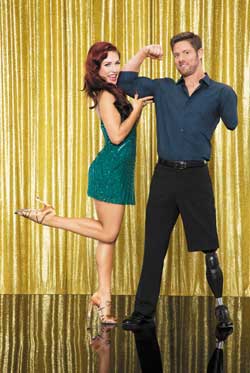Dancing To A Different Tune On ‘DWTS’
I have officially quit making excuses. And it’s because of this year’s season of ABC’s reality dance program Dancing with the Stars (DWTS).
Confession: This show is my guilty TV pleasure. It has it all: plucky celebrities, gorgeous ballroom professionals wearing sequined dental floss for costumes, big hair that stays put, fake eyelashes on steroids, tans with no strap lines, expert judges who fall off their chairs over a great performance (Hawaii’s Carrie Ann Inaba now wears a seat belt), live orchestra music, a couple of witty hosts and, oh yeah, great dancing.

Sharna Burgess and Noah Galloway ABC/CRAIG SJODIN PHOTO
DWTS also is ingenious at taking innocuous experiences of its contestants and milking them into tear-jerking video packages. We find out that, for example, actress Demi Moore and Bruce Willis’s daughter Rumer, a finalist this season, has been taunted online for being ugly, or anyway not as pretty as her famous mom. (Shocking, anonymous cyberbullies dissing a celebrity!) Suddenly, we’re sniffling over the “adversity” of this highly privileged, well-educated, talented, attractive daughter of two loving parents. It’s dramatic manipulation in its highest form, and we viewers lap it up.
Recently, though, a few contestants have come along with true adversity: hearing impaired actress Marlee Matlin, on season 6, who managed to dance in rhythm to music she couldn’t hear; season 13 winner and Iraq war veteran- turned-actor J.D. Martinez burned on more than 34 percent of his body and face; and Amy Purdy, season 18 runner-up, a double amputee and Paralympic snowboarding medalist. These three were the real deal.
But this season, DWTS raised the degree of difficulty.
Contestant Noah Galloway, Alabama native and former U.S. Army sergeant, left college to serve his country after the 9/11 terrorist attacks. As a member of the 101st Airborne Division during the initial 2003 Iraq invasion, he returned unscathed. But during his second tour in 2005, his luck ran out. An IED took two limbs, leaving him with dark days of depression, alcohol abuse and valid excuses for despair.
Eventually, Galloway pulled himself out of that pity pit. In the competition, he’s a man on fire to show the world that people are much more than the sum of their body parts. But, realistically, despite stunning good looks and abs of steel, he’s still missing limbs critical for technical ballroom dancing: a left arm and left leg. Yet, he’s done the impossible each week using his remaining upper arm to lead his professional partner, Sharna Burgess, around the dance floor while pivoting on a rigid prosthetic leg that forbids forward weight. He’s literally redefining dance.
Yet, humbly and without excuse, Galloway accepts lower scores by judges who repeatedly remind him that they can’t take his disability into account.
I’ll posit that since Galloway has half a body, he should get double the score.
But he wouldn’t want a handicap, as in horse racing or golf, but would rather be judged by his performance. DWTS honors his heroism by using this platform to pass on life lessons, especially to young people who are allowed to watch: perseverance, challenging oneself, taking criticism with class and humility, pushing limits, overcoming fears and no excuses. (And, of course, how to keep the costumes covering all the private body parts.)
A couple of weeks ago, a shirtless Galloway danced a contemporary routine to the song American Soldier by Toby Keith. (I’ve counted up the cost, I know the sacrifice. Oh, and I don’t want to die for you/ But if dying’s asked of me, I’ll bear that cross with honor/ ’Cause freedom don’t come free …)
I imagined 10 million viewers gasping with me when suddenly he lifted Burgess up over his head with a muscular right arm, while steady and balanced on his leg — and a half. It was then that, like me, a chunk of Americans probably swallowed hard and took a look at all the excuses we constantly make for ourselves — and for others.
No more excuses.





